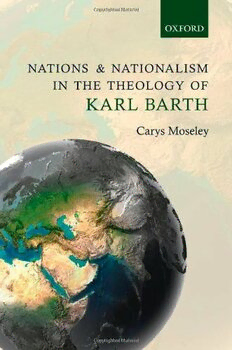
Nations and Nationalism in the Theology of Karl Barth PDF
Preview Nations and Nationalism in the Theology of Karl Barth
NATIONS AND NATIONALISM IN THE THEOLOGY OF KARL BARTH This page intentionally left blank Nations and Nationalism in the Theology of Karl Barth CARYS MOSELEY 1 3 GreatClarendonStreet,Oxford,OX26DP, UnitedKingdom OxfordUniversityPressisadepartmentoftheUniversityofOxford. ItfurtherstheUniversity’sobjectiveofexcellenceinresearch,scholarship, andeducationbypublishingworldwide.Oxfordisaregisteredtrademarkof OxfordUniversityPressintheUKandincertainothercountries #CarysMoseley2013 Themoralrightsoftheauthorhavebeenasserted FirstEditionpublishedin2013 Impression:1 Allrightsreserved.Nopartofthispublicationmaybereproduced,storedin aretrievalsystem,ortransmitted,inanyformorbyanymeans,withoutthe priorpermissioninwritingofOxfordUniversityPress,orasexpresslypermitted bylaw,bylicenceorundertermsagreedwiththeappropriatereprographics rightsorganization.Enquiriesconcerningreproductionoutsidethescopeofthe aboveshouldbesenttotheRightsDepartment,OxfordUniversityPress,atthe addressabove Youmustnotcirculatethisworkinanyotherform andyoumustimposethissameconditiononanyacquirer BritishLibraryCataloguinginPublicationData Dataavailable LibraryofCongressCataloginginPublicationData Dataavailable ISBN 978–0–19–966892–2 PrintedinGreatBritainby MPGBooksGroup,BodminandKing’sLynn LinkstothirdpartywebsitesareprovidedbyOxfordingoodfaithand forinformationonly.Oxforddisclaimsanyresponsibilityforthematerials containedinanythirdpartywebsitereferencedinthiswork. ‘From one ancestor he made all nations to inhabit the whole earth, and he allotted the times of their existence and the boundaries of the places where they would live, so that they would search for God and perhaps grope for him and find him—though indeed he is not far from each one of us.’ Acts 17:26–27 Acknowledgements This book started life as a PhD thesis submitted to the School of Divinity of the University of Edinburgh back in September 2007. I wish to express my thanks to my former doctoral supervisor Dr John C. McDowell for his advice concerning the nature and development of this thesis, for his enthusiasm for the project and his patience in supervising my work. He showed a real grasp of the importanceofresearchingandwritingonthepoliticaldimensionsof Barth’s theology and ethics. I must also thank Professor William F. Storrar who first accepted me to study for a PhD at the School of Divinity of the University of Edinburgh, for his encouragement and interestinmyworkbothwhenhefirstsupervisedme,andafterheleft EdinburghforPrinceton.ThanksarealsoduetomyPhDexaminers, Professor Timothy Gorringe and Professor Michael Northcott, for making the viva a stimulating and enjoyable experience, and for encouraging publication of the thesis as a book. I was glad they foundit readablethen, but Ihave feltthe needto transform thetext furthertobemoreproperly‘bookish’instyle,inthebestsenseofthe term. Then, I must also extend my gratitude to the two anonymous readerswhoreadthedraftssenttoOUP,alongwithmyeditorsTom Perridge and Elizabeth Rowbottom, and all the other staff at OUP whohaveenabledthisbooktocomeintobeing.Mycolleaguesonthe academic and support staff of the School of Divinity, including computingandlibrarystaff,havebeenunfailinglysupportiveduring my period of study and subsequent employment at the School of Divinity as British Academy Postdoctoral Research Fellow (2008– 2011).Theirsupporthasenabledmetocompleteboththisbookand a second book also in the process of publication. The students who were brave enough to take the Honours course on Karl Barth which I taught at the School in 2008 and 2009 endured some of the arguments put forward in this book, transformed into lecturing material. They deserve a round of applause for making it through a coursepackedwithdizzyingprimaryreadingsfromBarth,something which prompted one of them to ask me early on, ‘what is Barth’s question?’ This book attempts to show in an oblique way that for Barth, the God of Israel became the questioner, and he the ‘great Acknowledgements vii question’ (as with Augustine). Books are never completed without encouragementfromfriends.InthisrespectIthankMargaretActon foradviceandsupportconcerningthecompletionofthethesis.Ialso wish to thank Susan Allister for proofreading parts of the thesis. Lastly I wish to thank my parents for their personal and financial support throughout the time I have worked on this thesis. This projectcouldnothavebeencompletedwithouttheirsupport. This page intentionally left blank Contents Introduction 1 ReadingKarlBarthacrossthefourfolddivisionofGerman Protestanttheology 3 Nationalisminwesternthought:widerissuesinscholarship 9 Thepresentbook’scontributiontoBarthstudies 12 Planofthisbook 31 1. DisplacingPatriotism 33 SwisspatriotismasmediatorofChristiansocialism 33 ThebreakwithliberalProtestanttheology 43 RestoringtheSpiritofPentecost 49 2. DiscardingFalseFoundations 65 TheGöttingenyears 65 ThemovetoMünster 83 3. NationalismasIdolatry 98 Fromdogmaticstohomiletics 98 RespondingtotheriseofNationalSocialism 107 Dogmaticsagainstidolatry 117 4. Election,Nation,andState 134 ReworkingCalvinonelectionandthestate 134 ThetheologicalresponsetotheSecondWorldWar 142 Theethicalandpoliticalimplicationsofelection 149 5. EncounteringourNeighbours 169 Israelandtheprovidentialorder 169 NationhoodwithinthecommandofGod 176 Nationhoodaccordingtotheologicalexegesis 187 Conclusion 203 Bibliography 207 Index 217
